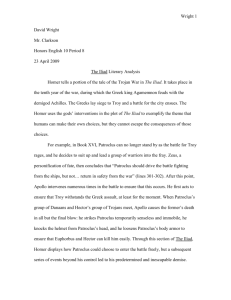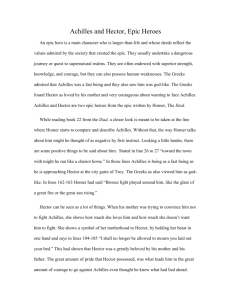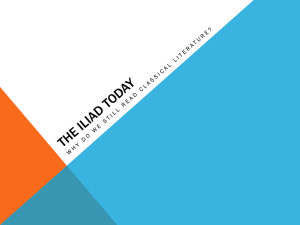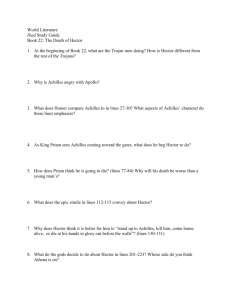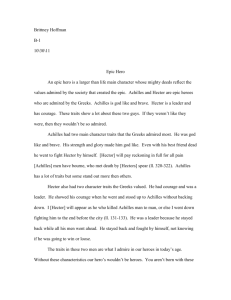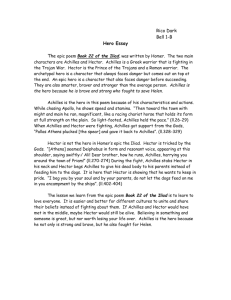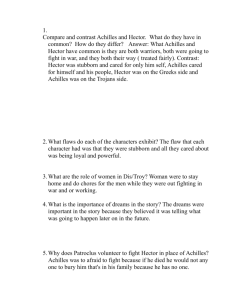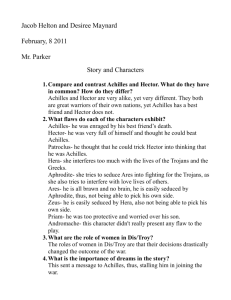Book 24
advertisement
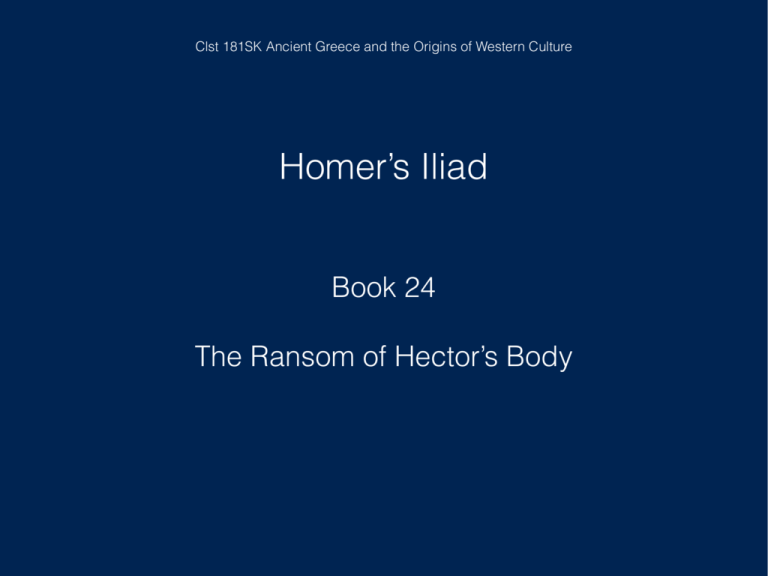
Clst 181SK Ancient Greece and the Origins of Western Culture Homer’s Iliad Book 24 ! The Ransom of Hector’s Body Clst 181SK Ancient Greece and the Origins of Western Culture Homer’s Iliad Book 24 ! The Ransom of Hector’s Body New characters: Hermes, messenger and psychopomp Homer’s Iliad Book 24 ! The Ransom of Hector Preliminaries Homer’s Iliad Book 24 ! The Ransom of Hector Patroklos and Hector - Prophecy and Death Book 16: Patroklos speaks to Hector (lines 846ff.) ! But I will tell you something … Your own life is not long but death already stands close beside you, and powerful fate, that you be killed at the hands of Achilles…. So he spoke, and then death covered him, and his breath-soul fled to the house of Hades, lamenting its fate, leaving behind manliness and youth.” Book 22: Hector speaks to Achilles (lines 846ff.) ! … Only think of this: that I will become the anger of the gods on that day when Paris and Phoibos Apollo kill you at the Scaean Gates… So Hector spoke. Then death covered him, and his breath-soul fled to the house of Hades, lamenting its fate, leaving behind manliness and youth.” Homer’s Iliad Book 24 ! The Ransom of Hector Second Self Theme: Achilles, Patroklos, Hector Homer’s Iliad Book 24 ! The Ransom of Hector Second Self Theme: Patroklos, Hector, Achilles Patroclus dons Achilles' armor: a "second self" to Achilles? If so, in what sense? What part of Achilles' self does P. represent? What then does Achilles mourn? (This is not at all clear to me, but note "gentle Patroclus" who then transforms into a battle hero.) Achilles' reaction to the death of Patroclus is overblown, extreme. And it leads, if only eventually, to some sort of coming to terms with himself, who he is, what sort of values he finally espouses. Homer’s Iliad Book 24 ! The Ransom of Hector Second Self Theme: Achilles, Patroklos, Hector Hector then dons, from Patroclus, the old armor of Achilles while Achilles then gets new armor: thus, when Achilles kills Hector, he is killing someone in his own armor: a killing of the self, in some metaphorical terms? A killing of his old "self"? But in what sense? ! Note: Hector is the “hero” other than Patroklos known as gentle. Homer’s Iliad Book 24 ! The Ransom of Hector Second Self Theme: Achilles, Patroklos, Hector As we’ve seen in Books 16-22, Achilles becomes rather suddenly de-humanized, "god-like" in the sense of being far from a human as well as in the sense of being a warrior beyond all human warriors. In this sense, this section of the poem can be seen as Achilles' "death" in the sense of his total separation from humanity: his grief for the death of Patroclus and then his "carthartic" killing of Hector might be seen as symbols of his coming to grips with who he is. It also raises the larger question: what should one properly value in a hero? Homer’s Iliad Book 24 ! The Ransom of Hector Second Self Theme: Achilles, Patroklos, Hector Perhaps, then, Patroclus is the "self" (or, if you prefer, the contrasting character) who defines what is gentle and kindly, but who, on donning Achilles' armor, is transformed into the relentless (and hubristic) warrior: on his death, Achilles realizes the loss clearly: the loss of something kind and gentle, something deeply human in his life. His reaction is not a realization of the loss, but a reaction of crazed revenge. With deep irony, the revenge is directed against Hector, the Trojan most associated with humanity, gentleness, kindness, the one hero who carries these qualities in the domestic sphere yet remains a great warrior. It is only with the death of Hector that Achilles can begin to relent. But, unlike a typical revenge story, he (and we) is not really satisfied with the revenge, and there is need for further realization before Achilles can begin to put together the link, so clearly objectified in the armor, between Patroclus and Hector, that link to a humanness inside, distorted into a warrior's ferociousness by the armor outside. The armor then is the symbol of the warrior who is obsessed with battle, relentless, inhuman, and these deaths force Achilles to reevaluate this side of himself. Homer’s Iliad Book 24 ! The Ransom of Hector Book 23: Funeral Games for Patroklos/Patroclus In this book, Achilles still will not eat. He performs an unusual sacrifice over the funeral pyre: 4 stallions, 2 dogs, 12 Trojan youths. But as the games begin, we see Achilles gradually loosening up, and assuming the civilized role of host, king, gift-giver. (The games also, brilliantly, allow to poet to revisit each of the main heroes, ending with Agamemnon.) ¶ When the other heroes argue, Achilles moderates and suggests compromises. ¶ He gives the spear-throwing prize at once to Agamemnon to obviate any potential embarassment to the King of Kings-- the last act of these games. ¶ We are far removed from Achilles' old complaint that Agamemnon always gets the best prize without doing anything to earn it (1.165ff, 9.332ff). Homer’s Iliad Book 24 ! The Ransom of Hector Reconciliation: what it means to be human Homer’s Iliad Book 24 ! The Ransom of Hector Reconciliation: what it means to be human Reconciliation: what is different in book 24? ! • • • • • • • The gods show pity and relent (or at least Zeus): it seems that they have seen enough, that the world has come too close to spiraling out of control, that all has finally become too inhuman for this very anthopomorphic set of deities Achilles shows pity and relents: true, he is commanded by Zeus, but this is a classic instance of "overdeterminism" where the gods command but also the human does this by his own free will Priam is now the one "with a heart of iron" Eating is intimately bound up with resolution and reconciliation (cf. Odyssey) Supplication, and acceptance of the ransom (cf. book 1, book 9): note how unusual Priam's opening: "Remember your father!" - cf. Chryses book 1, Lycaon book 21 (also Phoenix in book 9) Achilles for the first time since book 1 shows self-restraint, and for the first time leaves aside his self (or second-self) absorption: here we find the sympathy for Priam, the control of his anger, the urge to food and consolation, the agreement to a truce for burial. Achilles "has come at last to the level of humanity, and humanity at its best; he has forgotten himself and his wrongs in his sympathy for another man." Bernard Knox. Note how far behind now is the warrior society based on timê, kleos, and the like. We feel that Achilles, doomed soon to die, will now go into battle with much the same attitude as Hector at the end of book 6: because it is his duty. The war will continue, but gifts such as the ransom of Priam are no longer important in themselves: rather they are now properly understood as part of the social fabric, rather insignificant in themselves but emblems of what is very significant: the binding of men through shared suffering, pity, sorrow: that pity, or better, sympathy that is the core of humane social interactions. Homer’s Iliad Book 24 ! The Ransom of Hector Reconciliation: what it means to be human Not a "happy ending" but also not entirely bleak or pessimistic, even though the war will go on and Troy will fall ! The conclusion of the poem is overshadowed by the coming death of Achilles and the fall of Troy -- note the brutal foreshadowing of the death of Astyanax, 24.714f. But the Iliad is great not least because it can speak authentically for pity or kindness or civilization without showing them victorious in life. Its humanity does not float on shallow optimism; it is firmly and deeply rooted in an awareness of human reality, frailty, and suffering. ! The end is both sad, then, and curiously uplifting. The return to war is inevitable, but the human values of civilized man have returned to the world. The Trojans perform the rites of burial for Hector so important for consolation in times of grief, so essential for the sense of humanized, civilized life. Their last act is a "splendid funeral feast", the sharing of food among men that is a quintessential symbol of civilization (as we shall see!). When Hector is pronounced buried, we are sad, of course, but also convinced that the normal human values are back in place, that allow pity and consolation and reconciliation, even between enemies. And so the poem ends: Thus did the Trojans go about the burial of Hector, breaker of horses.

